Anxiety disorders are a growing concern in modern society, affecting millions of individuals around the world. Recent studies have shown that magnesium could be a potential natural treatment for anxiety symptoms. Magnesium is an essential mineral found in various foods and supplements and has been linked to many health benefits. This article will explore how magnesium may help reduce anxiety symptoms and provide advice on how to incorporate it into your diet or supplement regimen.
For centuries, humans have used natural remedies to treat a variety of ailments, from physical pain to mental health issues like depression and anxiety. While traditional pharmaceuticals can be effective, many people are turning toward natural alternatives, such as herbs, minerals, and vitamins, for the treatment of these conditions. One mineral, in particular, has recently gained attention for its potential ability to treat anxiety: magnesium.
Magnesium is an essential mineral found naturally in a variety of food sources, such as leafy greens, nuts, seeds, whole grains, legumes, dairy products, and fish. It is also available as a dietary supplement in various forms. Research indicates that magnesium can help reduce anxiety symptoms by modulating brain chemistry and enhancing neurotransmitter function. In this article, we will explore the evidence behind magnesium’s ability to treat anxiety symptoms and provide advice on how to incorporate it into your diet or supplement regimen.
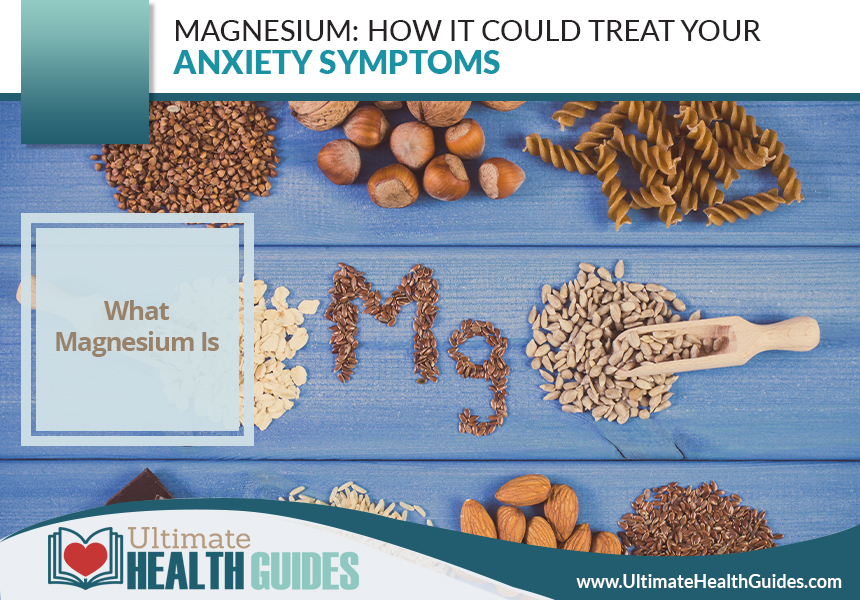
What Magnesium Is
It’s sometimes the case that our mental health can be a struggle. This can manifest in a variety of ways, such as feelings of unease or bouts of anxiety. It’s critical to note that these are normal emotions, and there is no shame in seeking out strategies to help manage them. One potential solution may lie with an essential nutrient: magnesium.
Magnesium is an element found in abundance throughout nature and within us, too. A key player in the human body, it supports numerous processes, including muscle function and energy production. It’s also thought that magnesium could play a role in reducing the intensity of certain psychological symptoms – particularly those associated with anxiety.
This mineral has long been used as part of holistic medical treatments, but recent research shows that it may have more far-reaching implications than previously thought. With its potential ability to regulate stress levels, magnesium could provide a critical avenue for improving our overall well-being. As we move on, let us delve further into what signs indicate a deficiency in this essential nutrient may be at play.
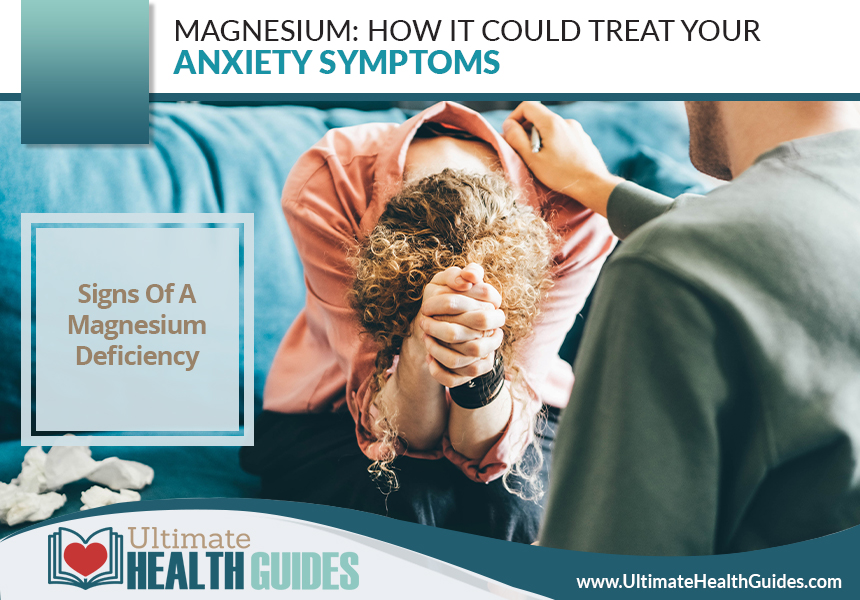
Signs Of A Magnesium Deficiency
Magnesium deficiency is a common problem, affecting up to 75% of the population. Symptoms can range from mild to serious and include fatigue, muscle cramps, weakness, anxiety, and depression. It’s vital to be aware of the signs of magnesium deficiency so that it can be treated before it becomes a more serious health concern. If left untreated, a magnesium deficiency can have serious impacts on physical and mental health. Here are four key signs of magnesium deficiency.
- Muscle Cramps: Magnesium plays a critical role in muscle relaxation and contraction. A lack of magnesium can lead to frequent or persistent muscle cramps or spasms throughout the body.
- Fatigue: Low levels of magnesium can cause tiredness and exhaustion due to decreased energy production in cells.
- Anxiety/Depression: Magnesium helps regulate serotonin levels in the brain, which affects moods and emotions. Those with low levels may experience increased symptoms of anxiety or depression.
- Poor Sleep Quality: Magnesium has been shown to improve sleep quality for those with insomnia or other sleep disturbances by promoting deeper sleep cycles.
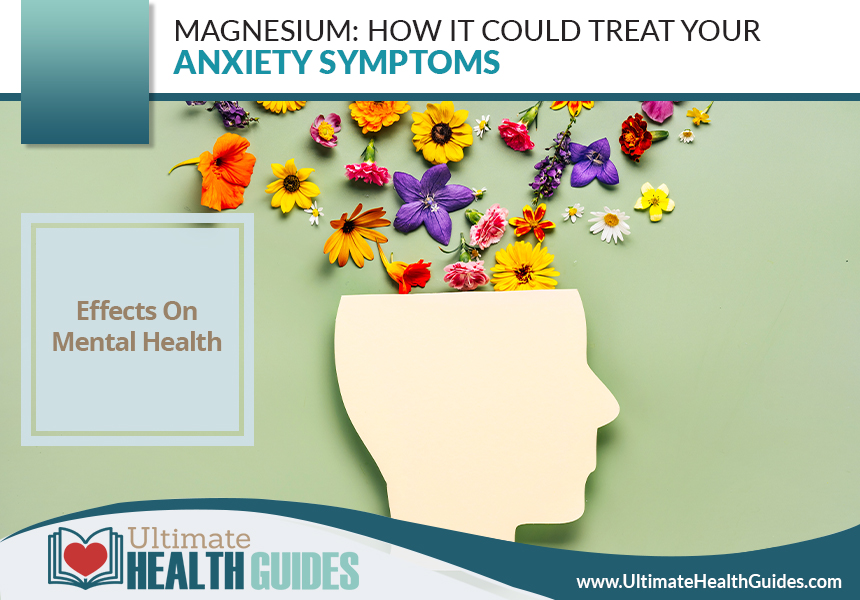
Effects On Mental Health
Mental health is a significant concern for many individuals, and magnesium can be beneficial in treating anxiety symptoms. The essential mineral affects the body in various ways, including its effects on mental health. The following table provides an overview of its impact.
| Positive Effects | Negative Effects | |
|---|---|---|
| Anxiety | Reduces feelings of fear and tension Improves sleep quality | Can cause drowsiness if too much is taken at once Can interact with other medications |
| Mood | Enhances cognitive functioning Improves mood and outlook | May not be effective for everyone |
Magnesium binds to certain neurotransmitters in the brain, such as serotonin, gamma-aminobutyric acid (GABA), dopamine, and glutamate. It helps boost serotonin levels, which are associated with better moods and stress relief. Additionally, it reduces glutamate activity, which can improve cognitive function and reduce anxiety. This mineral also improves sleep quality by reducing cortisol levels, which can increase when experiencing anxious thoughts or emotions.
Although magnesium appears to have positive effects on mental health, it is vital to note that it may not be effective for everyone. Furthermore, taking too much magnesium can lead to drowsiness due to its sedative properties, so it is vital to be careful with your dosage. To sum up, magnesium has been shown to have positive effects on mental health by increasing serotonin levels and decreasing glutamate activity. Moving forward, let’s discuss the benefits of using magnesium for treating anxiety symptoms.
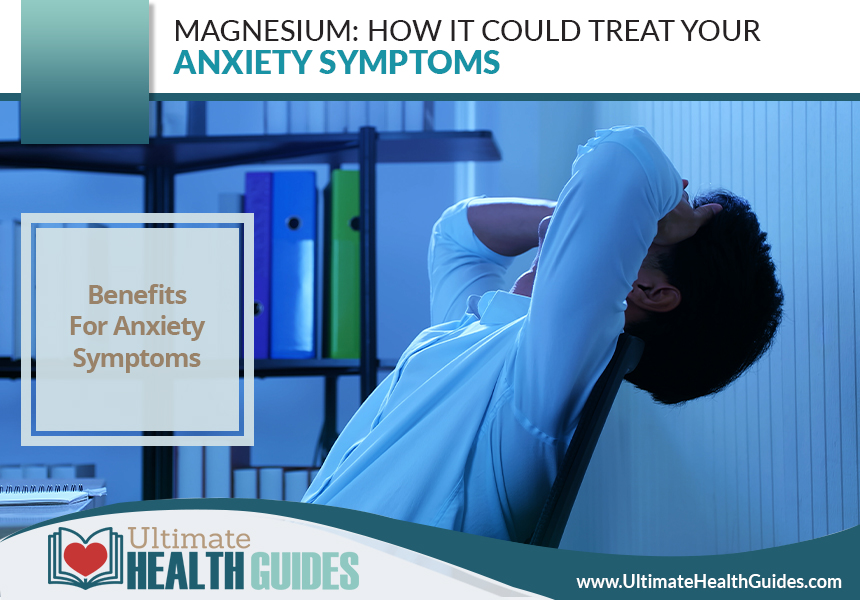
Benefits For Anxiety Symptoms
Recent research has shown that magnesium may provide some relief for anxiety symptoms. It is thought to help balance neurotransmitters in the brain, which can reduce feelings of fear and panic. It can also help increase GABA production, a calming neurotransmitter that helps regulate moods. Moreover, magnesium has been found to improve sleep quality, which is crucial for managing anxiety.
Magnesium has been used in various forms as a natural remedy for anxiety and related disorders. Several studies have demonstrated its efficacy when taken orally in supplement form or transdermally (through the skin) in cream or lotion form. In addition, magnesium-rich foods have been found to be beneficial in reducing the severity of anxiety symptoms.
Therefore, it is clear that magnesium could be an effective treatment option for individuals struggling with anxiety symptoms. Further research is needed to fully understand the potential benefits of this mineral and its ability to combat anxiety-related issues. However, given the current findings, it appears that incorporating magnesium into one’s diet or supplement routine may prove beneficial for those dealing with anxiety-related concerns.
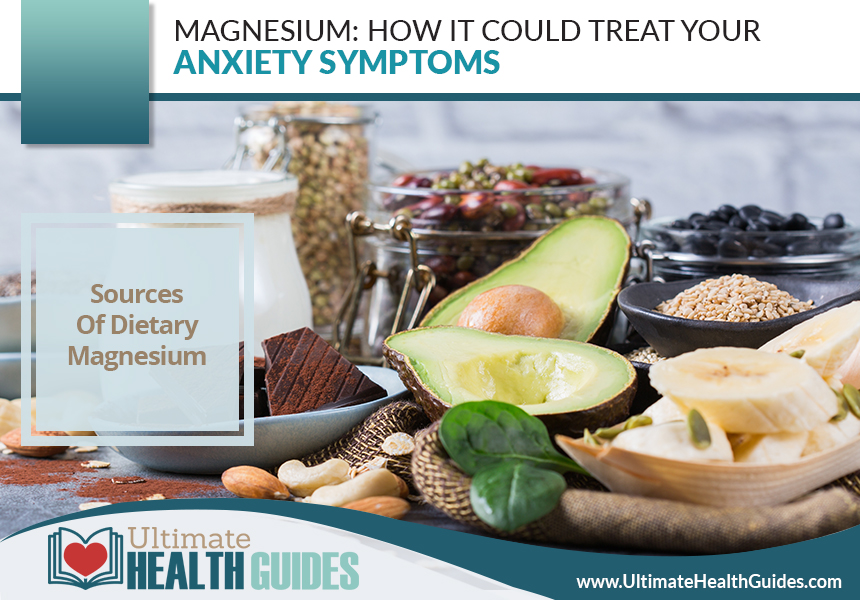
Sources Of Dietary Magnesium
Sources of dietary magnesium are like pieces of a puzzle; when combined, they form a picture of health and well-being. Magnesium is found in a variety of foods – some more than others. It’s important to note that many processed foods contain fewer nutrients, including magnesium, than their natural counterparts. Here are the best sources of dietary magnesium.
- Whole grains, such as brown rice, oats, barley, and buckwheat, are great sources of magnesium; these whole grains can be added to salads or made into delicious breakfast cereals.
- Legumes, such as beans, peas, and lentils, also offer a good source of dietary magnesium. Regularly eating these will help ensure that you get sufficient dietary magnesium.
- Nuts and seeds are other excellent sources of this essential mineral. Pumpkin seeds, in particular, are high in magnesium and make for a tasty snack.
- Green leafy vegetables, such as spinach, kale, and Swiss chard, are loaded with nutrients, including magnesium. Eating plenty of these nutrient-dense vegetables can help make up for any shortfall in your daily diet from other sources.
- Finally, dairy products, such as milk and yogurt, provide another source of dietary magnesium that can easily be incorporated into an everyday meal plan.
With so many delicious options available when it comes to getting enough dietary magnesium, it’s easy to create meals that not only taste good but also have benefits for mental well-being! Knowing which foods to include in your diet is the first step toward managing anxiety symptoms through increased intake of this vital mineral. Now, let’s look at supplementing with additional doses and understanding how much should be taken on a daily basis.
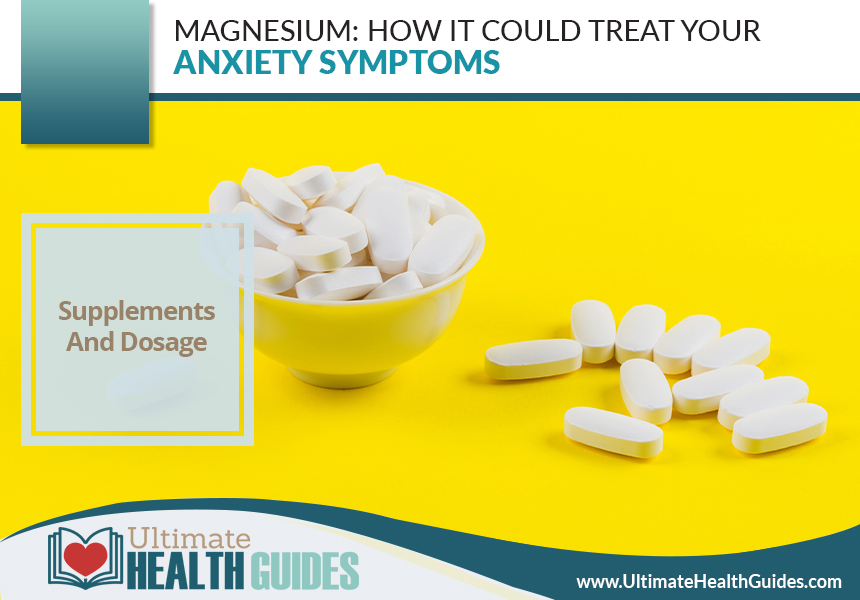
Supplements And Dosage
When it comes to magnesium supplementation, it is vital to choose the correct form of magnesium. Different forms of magnesium have different absorption rates and may affect people differently. Magnesium citrate is thought to be the best-absorbed form, while other forms, such as magnesium oxide, magnesium chloride, and magnesium sulfate, are also available.
It is recommended that adults consume 400 mg of dietary magnesium per day, although needs may vary depending on age, gender, pregnancy status, and health conditions. Taking too much can cause adverse effects, such as diarrhea, nausea, and stomach upset. Therefore, if you are thinking about taking a supplement, it is crucial that you consult with your healthcare provider first in order to determine an appropriate dosage for your individual needs.
In addition to discussing dosages with healthcare providers, individuals should also be aware of potential interactions between supplements and medications they are taking. Magnesium can interact with certain drugs, like antibiotics and diuretics, which can lead to potential side effects or decreased effectiveness of medications being taken. Careful consideration is needed when adding any supplements to a regimen due to the potential risks associated with them.
As always, safety should be a priority when deciding whether or not supplementation is right for you. Understanding their own individual needs and taking into account potential interactions and side effects before starting any supplement regimen can help individuals make informed decisions about their healthcare needs. With this knowledge in hand, they can move forward toward finding freedom from anxiety symptoms by exploring the potential benefits of using magnesium as part of their overall treatment plan.
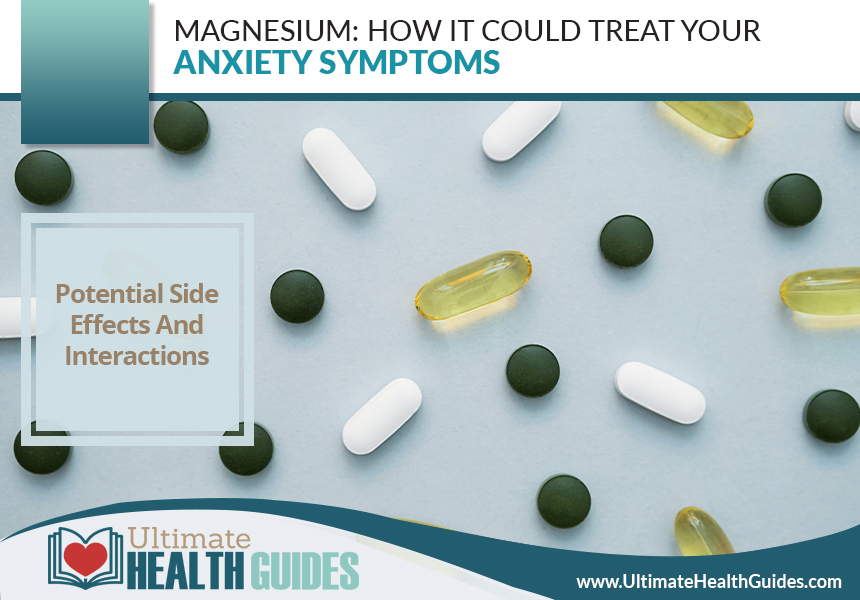
Potential Side Effects And Interactions
As with any drug, it is crucial to be aware of the potential side effects and interactions associated with magnesium supplementation for anxiety. In this section, we’ll discuss some of the possible risks and contraindications. Be aware of these before making a decision about whether or not to take magnesium for anxiety.
The most common side effect reported from taking magnesium supplements is an upset stomach. This can range from mild abdominal discomfort to more serious gastrointestinal conditions, such as constipation or diarrhea. It is also possible to experience headaches, lethargy, and nausea while taking magnesium supplements. Other rarer side effects may include muscle weakness, confusion, and dizziness.
It’s critical to be aware that there are potential drug interactions associated with taking magnesium supplements. These include antacids, antibiotics, diuretics, calcium channel blockers, and certain antidepressants. If you are taking any of these medications, along with magnesium for anxiety relief, it’s crucial to see if you need to adjust your dosage in order to avoid any negative interactions. Before deciding on a course of action for managing anxiety symptoms, it’s worth considering other holistic approaches that may provide relief without the risk of any unwanted side effects or interactions.
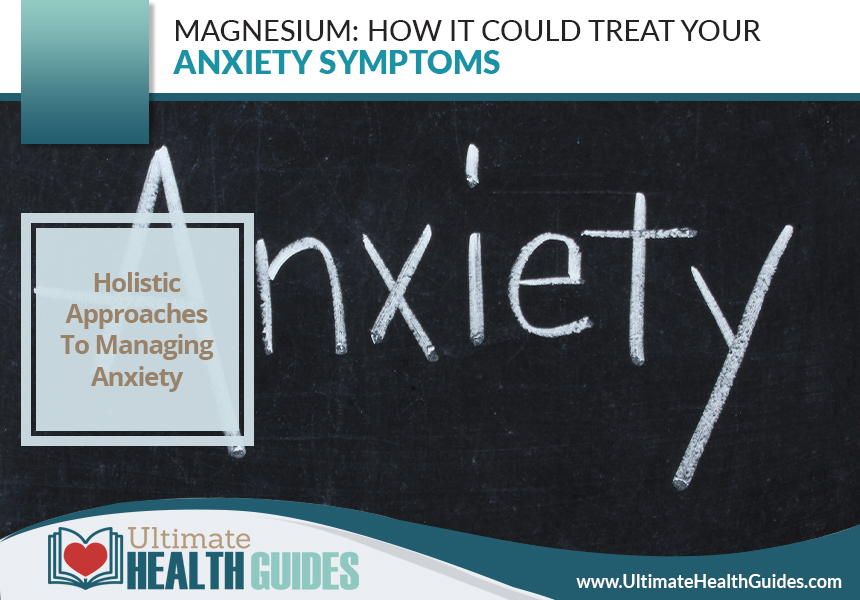
Holistic Approaches To Managing Anxiety
Moving on from potential side effects and interactions, we will explore holistic approaches to managing anxiety symptoms. A holistic approach to health focuses on an individual’s overall well-being and takes into account the mind, body, and spirit. There are several strategies that may be beneficial in treating one’s anxiety symptoms.
- Exercise: Exercise is a great way to release endorphins and reduce stress levels. It can also help improve sleep and focus, which can have a positive effect on anxiety.
- Mindfulness: Mindfulness involves focusing your attention on the present moment rather than worrying about what has happened in the past or what might happen in the future. It can help reduce rumination and bring clarity to stressful situations.
- Nutrition: Eating a nutrient-rich diet with plenty of fruits, vegetables, whole grains, healthy fats, and proteins can promote physical and mental well-being, which may help alleviate anxiety symptoms.
These approaches are all integrative methods for managing anxiety symptoms without resorting to medications or other forms of treatment that may carry unwanted side effects or interactions. Additionally, many of these approaches are low-cost or free. Hence, they are accessible to everyone regardless of their financial situation.
Although it is critical to address any underlying medical conditions that could be causing anxiety symptoms, exploring holistic strategies, such as exercise, mindfulness, nutrition, etc., may provide relief from one’s anxious state while avoiding the use of medication or traditional treatments alone. As such, looking at alternative treatments for anxiety symptoms is a significant part of achieving total well-being.
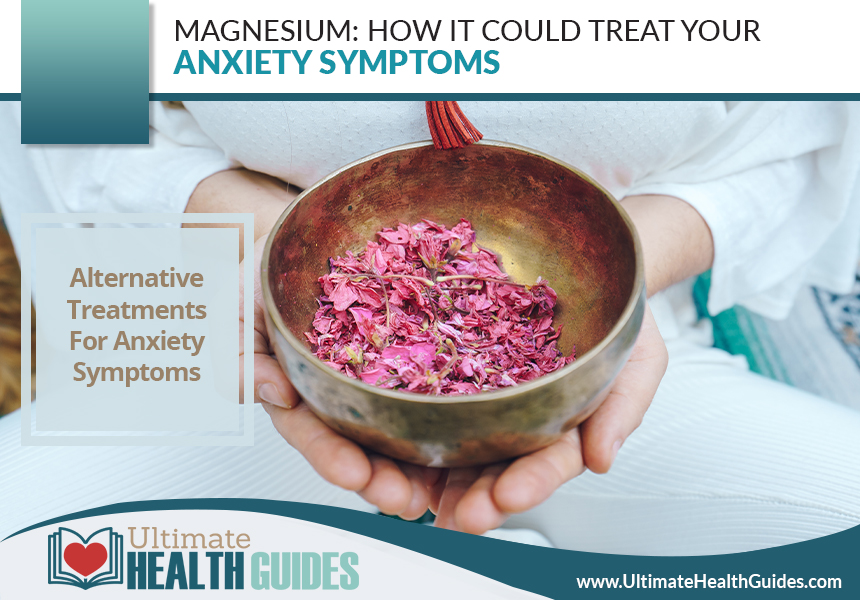
Alternative Treatments For Anxiety Symptoms
Alternative treatments for anxiety symptoms focus on lifestyle changes and therapeutic interventions. Cognitive behavioral therapy (CBT) is a popular choice for individuals living with anxiety. CBT helps people identify negative patterns of thought and behavior and replace them with more positive ones. It also teaches relaxation techniques that can help reduce stress levels.
Magnesium is a powerful mineral in the body and can help reduce anxiety symptoms. It has been found to play a role in balancing out neurotransmitters, such as serotonin and dopamine, both of which are involved in managing mood and emotions. Studies have suggested that magnesium supplementation might be beneficial for those experiencing anxiety; however, further research is needed to confirm this.

When Magnesium Isn’t Enough
While magnesium supplements can be a helpful natural remedy for anxiety, it’s important to understand that they may not be suitable for everyone. If you’re experiencing symptoms of anxiety that are affecting your daily life, relationships, and work productivity, it’s necessary to seek guidance from a qualified healthcare professional. In some cases, natural remedies, like magnesium supplements, may not be enough to manage your symptoms effectively, and you may require medical assistance. It’s crucial to recognize when it’s time to seek professional help, especially if your symptoms are worsening over time or if you’re experiencing thoughts of self-harm or suicide.
It’s recommended to consult with a doctor or naturopath to get personalized and effective treatment options. A qualified healthcare professional can assess the severity of your anxiety and recommend suitable treatment options, which could include medication or therapy. They can also explore the underlying causes of your anxiety and suggest lifestyle changes or nutritional counseling if required. Ignoring symptoms of anxiety can have long-term negative impacts on both physical and mental health. Seeking help from a qualified healthcare professional as soon as possible can help you manage your symptoms and lead a healthier and happier life.
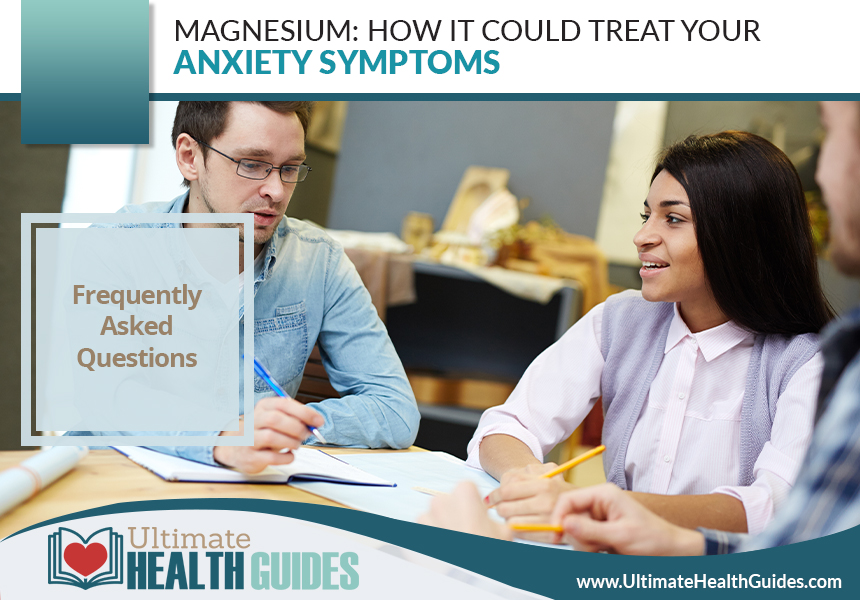
Frequently Asked Questions
How Long Does It Take For Magnesium To Start Treating Anxiety Symptoms?
When it comes to treating anxiety symptoms, many people consider the use of magnesium. But how long does it take for magnesium to start working? This article examines the current research on this subject and provides insight into what you can expect from taking magnesium.
Recent studies have shown that magnesium may be beneficial in reducing symptoms associated with anxiety. While the exact timeframe for symptom relief varies, some individuals have reported positive results within a few weeks of supplementation. Specifically, participants in a study who took 600 mg of magnesium daily experienced significant decreases in their anxiety levels after four weeks of treatment.
At the same time, other studies suggest that longer-term use may be necessary for sustained symptom improvement. For example, one study found that those who took 375 mg of magnesium daily for 12 weeks experienced significant reductions in the severity of their anxiety symptoms compared to those taking placebo. As such, while some people may experience quicker results with shorter-term supplementation, it appears that using magnesium over long periods of time is needed for more effective and lasting symptom reduction.
Does Magnesium Interact With Any Other Medications Or Supplements?
As the saying goes, “An ounce of prevention is worth a pound of cure.” This is particularly true when it comes to medications and supplements. Before starting any regimen, it’s critical to understand if and how they interact with other substances. In this article, we will explore this question: Does magnesium interact with any other medications or supplements?
The short answer is yes. Magnesium can interact with several different kinds of medications and supplements, including antacids, antibiotics, diuretics, and certain heart drugs. It can also affect the absorption of calcium and iron supplements. It is important to exercise caution and research potential interactions with other medications or supplements before taking magnesium. For those who decide to take magnesium for anxiety symptoms, there are several things to keep in mind.
- Monitor your dosage. Too much magnesium can cause diarrhea or even lead to an electrolyte imbalance.
- Take it at night. Magnesium may help promote better sleep patterns, which, in turn, can aid anxiety relief.
- Ensure proper nutrition. Eating a healthy diet rich in foods containing magnesium can help increase your overall levels of the mineral while avoiding unwanted side effects from supplementing alone.
Given its potential interactions with other substances, it is necessary that individuals exercise caution prior to taking magnesium. This way, they can make an informed decision about their healthcare needs. If taken responsibly under the guidance of a medical professional, many people have found that magnesium has been beneficial in helping them cope with anxiety symptoms.
Are There Any Negative Side Effects Of Taking Magnesium For Anxiety?
Magnesium has been gaining popularity as an alternative treatment for anxiety. It is generally safe and well-tolerated. However, there are potential negative side effects associated with taking magnesium for anxiety.
First, it is important to be aware that magnesium may interact with some medications or supplements. For example, magnesium may interact with antibiotics, diuretics, calcium channel blockers, and certain heart medications. Therefore, it is paramount to discuss any potential interactions with your healthcare provider before beginning supplementation.
Second, although mild side effects of taking magnesium are typically not serious, they can still be bothersome. Common side effects include nausea, abdominal cramping, and diarrhea. In addition, there is a risk of more serious side effects, such as low blood pressure or irregular heartbeat, when taken in large doses over long periods of time.
Finally, it is vital to consider the possible risks of taking magnesium for anxiety. It could interact negatively with other medications or supplements. It can cause unpleasant but harmless side effects. There is a risk of more serious side effects if taken in large doses over long periods of time. For these reasons, it’s best to speak to your healthcare provider before starting a supplement regimen to treat anxiety symptoms.
Is Magnesium Effective For All Types Of Anxiety?
As anxiety continues to affect more people, natural remedies are becoming increasingly popular. Magnesium is one of the most well-known options, but does it work for all types of anxiety? This article will discuss whether magnesium can provide relief from different forms of anxiety.
One of the most common questions asked when considering taking magnesium is how effective it is at treating different types of anxiety. While research has shown that magnesium can be an effective treatment for generalized anxiety disorder (GAD) and postpartum depression, its effects on other types of anxiety have not been extensively studied yet. However, there are some studies that suggest that magnesium may be beneficial in reducing symptoms associated with panic disorder, obsessive-compulsive disorder (OCD), social phobia, and specific phobias. Additionally, preliminary research also indicates that supplementing with magnesium may help reduce stress and improve mood in those who suffer from mild to moderate depression.
Overall, more research needs to be done on the efficacy of using magnesium for different types of anxiety disorders. However, current evidence suggests that it may be helpful for treating a range of conditions related to stress and mental health. It’s important to consult with a healthcare professional before starting any new treatment or supplement regimen to ensure safety and effectiveness.
Is There An Upper Limit To How Much Magnesium I Should Take?
It is crucial to consider the upper limit of magnesium intake when considering its use as a potential treatment for anxiety. While there is no definitive answer, research suggests that taking too much of this mineral can have adverse effects, particularly on those with kidney disease or other medical conditions. Here are two key points to remember.
- Magnesium is an essential mineral and has been found to be beneficial in treating certain types of anxiety.
- Taking too much magnesium can have adverse effects, such as kidney damage and other medical complications.
When considering the use of magnesium for anxiety relief, it is paramount to be aware of the possible side effects associated with overdosage. Excess magnesium may cause nausea, diarrhea, and abdominal cramps, among other symptoms. Additionally, high doses can interfere with other medications or exacerbate existing health conditions, such as kidney disease. Therefore, it is important to discuss any potential risks associated with supplementation with your healthcare provider prior to starting treatment.
Due to the potential for side effects, it is best to follow dosing instructions carefully and avoid taking more than the recommended dosage. Supplementation should also be monitored closely and adjusted accordingly if necessary. For people who suffer from chronic anxiety disorders or panic attacks, taking magnesium supplements may provide some relief; however, it should never replace professional medical advice or therapy if needed.
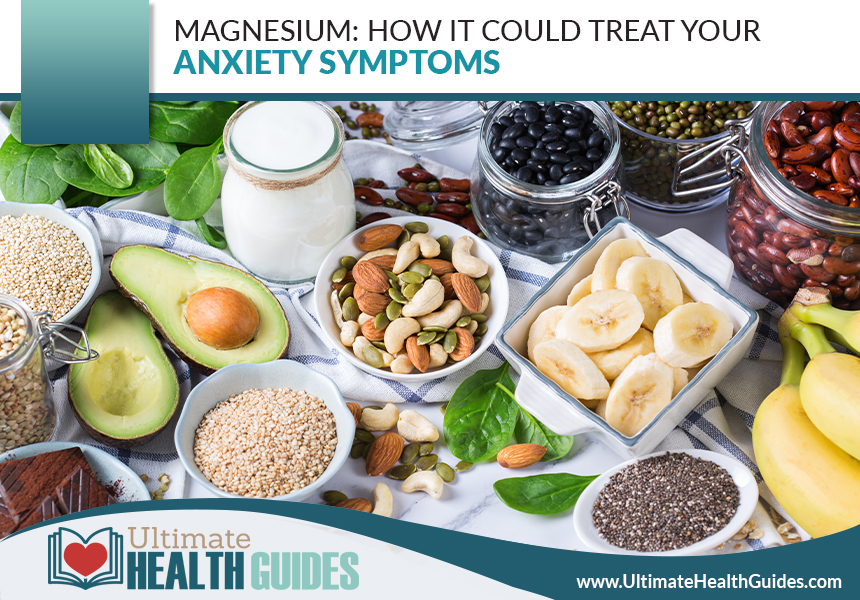
Conclusion
In conclusion, magnesium is a promising treatment for anxiety symptoms. Taking the right dosage and understanding potential interactions with other medications or supplements is paramount. It likely won’t work for everyone, and there is an upper limit to how much one should take.
Magnesium works gradually, like a slow-moving river, to treat the symptoms of anxiety. It has few negative side effects, and its effectiveness varies depending on the type of anxiety disorder being treated. With careful monitoring of dosage and any possible interactions, magnesium can help many people find relief from their anxiety symptoms.
<
p align=”justify”>Overall, magnesium is a safe and effective option for treating anxiety in many cases. Its effects may not be instantaneous. But with proper care and caution, it can be like a breath of fresh air to those suffering from anxiety disorders.














